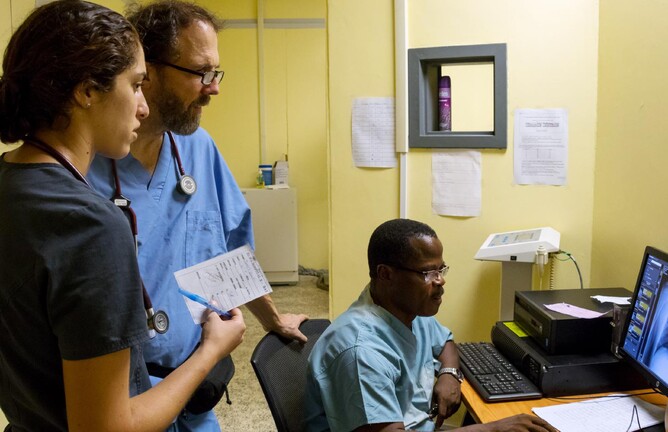Three MAF families in Rumginae, Papua New Guinea (PNG) are probably reading psalm 113:3 (From the rising of the sun to it’s setting, let the name of the Lord be praised) with more gratitude than ever before. Sunshine is not only providing them with warmth, light and Vitamin D—since December 2015 the sun is also providing them with energy!
Power has always been sparse and unreliable at Rumginae. It is a remote, hot, humid, and tropical area which needs a constant supply of electricity. Before the solar panels were installed, MAF staff in Rumginae had to deal with the most stressful situations when it came to undertaking everyday tasks requiring electricity. For a long period of time MAF families only had electricity between 8 am and 12 pm and between 5 pm until 10 pm. In the hot and humid climate of PNG this issue adds to the challenges of the MAF families who are trying to glorify God through their work whilst raising their children and providing a safe home for their families. MAF pilot Markus Bischoff reflects on the issues the lack of power had created for their family in Rumginae, “Madeleine (his wife) had to reorganise her day in order to do all the tasks requiring power during the morning hours. This is not that easy when you’re supposed to home school two of our four children at the same time. Then, with the fans not working in the afternoon, home schooling itself became trying, as the kids lost their focus in the heat. Furthermore, our youngest could not have a proper afternoon nap being grumpy instead of well rested, and last but not least we could not open the fridge until 5 pm which made preparing dinner in time a challenging undertaking.” Situations like these made it very difficult for MAF to work in PNG. Keeping food in a cold fridge is essential to our MAF staff as there are no shops in Rumginae and the unreliable power supply added anxiety to an already stressful day, making life increasingly taxing.
The temperatures consistently range around 30 C and humidity around 96%, which made conditions very trying and stressful. In an email from 26th June 2015 MAF pilot Luke Newell, who back then was living in Rumginae with his family, explained how hard life was without the solar panels, “This morning I have been at Rumginae since the power came on at 8:00 am and up to now (9:40 am) the generator has tripped/shut down 9 times. This apparently is not terribly uncommon, a bit more than average and the evenings are just as unreliable so we are hanging out for something else! We are at the stage again that we cannot use kettles/toasters etc. and this morning they are talking about rostering washing machine times.” To improve liveability and reliability the MAF staff at the base had two small generators to supplement the “grid” supply. However, these were very expensive to operate and not designed for full time operation. The unreliable source of electricity was threatening MAF’s work in Rumginae. MAF’s partnership with the Rumginae Hospital, the Evangelical Church of Papua New Guinea, and Pioneers missionaries in the area could not continue if Rumginae is “un-liveable” due to lack of reliable electrical power.
Understandably, the families in Rumginae were very excited when Kevin White from New Zealand and a fantastic team of 5 Papua New Guineans came to install a 12kWh solar system on three MAF houses in November 2015. The team were from diverse tribal groups in PNG and enjoyed exploring the differences in their cultures whilst working on the solar panels. Their hard work paid off: after two weeks of labour under the hot sun and in pouring rain, 3 families in Rumginae finally had a whole 14-hours’ worth of electricity again.
A reliable supply of electricity into Rumginae not only reduces costs and ensure liveability. It also improves safety, which is vital for our families in PNG. Additional lightning arrestors were installed in the system to combat damage from lightning strikes by absorbing the electrical energy. Without them, direct strikes (which are frequent there), could cause fires in the houses. The installations have provided more comfortable living conditions for the MAF families, staff and their children. Markus Bischoff reports on the situation today, “Madeleine can do her work whenever she got a minute using a kitchen aid at 2 pm if need be. Our kids can learn better during their afternoon lessons as the ceiling fans keep their heads cool. And when we have a good “Solar Day” as our kids would say (i.e. a day with lots of sun) we can even let the fridge and some of the ceiling fans run through the night leaving frozen meat perfectly frozen and making sleep during a hot and humid night much more comfortable and refreshing.”
